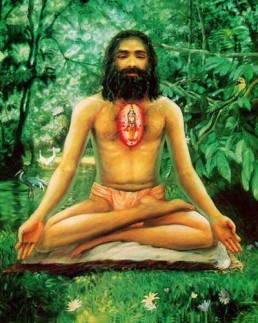भोगापवर्गार्थं दृश्यम् ॥ २.१८॥
bhogāpavargārthaṃ dṛśyam .. 2.18..
Patanjali Yogasutra Introduction
Part 1 – Samādhi-pāda – Yoga and its Aims
1.1
1.2
1.3
1.4
1.5
1.6
1.7
1.8
1.9
1.10
1.11
1.12
1.13
1.14
1.15
1.16
1.17
1.18
1.19
1.20
1.21
1.22
1.23
1.24
1.25
1.26
1.27
1.28
1.29
1.30
1.31
1.32
1.33
1.34
1.35
1.36
1.37
1.38
1.39
1.40
1.41
1.42
1.43
1.44
1.45
1.46
1.47
1.48
1.49
1.50
1.51
Part 2 – Sādhana-pāda – Yoga and its Practice
2.1
2.2
2.3
2.4
2.5
2.6
2.7
2.8
2.9
2.10
2.11
2.12
2.13
2.14
2.15
2.16
2.17
2.18
2.19
2.20
2.21
2.22
2.23
2.24
2.25
2.26
2.27
2.28
2.29
2.30
2.31
2.32
2.33
2.34
2.35
2.36
2.37
2.38
2.39
2.40
2.41
2.42
2.43
2.44
2.45
2.46
2.47
2.48
2.49
2.50
2.51
2.52
2.53
2.54
2.55
Part 3 – Vibhūti-Pāda – Powers
3.1
3.2
3.3
3.4
3.5
3.6
3.7
3.8
3.9
3.10
3.11
3.12
3.13
3.14
3.15
3.16
3.17
3.18
3.19
3.20
3.21
3.22
3.23
3.24
3.25
3.26
3.27
3.28
3.29
3.30
3.31
3.32
3.33
3.34
3.35
3.36
3.37
3.38
3.39
3.40
3.41
3.42
3.43
3.44
3.45
3.46
3.47
3.48
3.49
3.50
3.51
3.52
3.53
3.54
3.55
3.56
Part 4 – Kaivalya-pāda – Liberation
4.1
4.2
4.3
4.4
4.5
4.6
4.7
4.8
4.9
4.10
4.11
4.12
4.13
4.14
4.15
4.16
4.17
4.18
4.19
4.20
4.21
4.22
4.23
4.24
4.25
4.26
4.27
4.28
4.29
4.30
4.31
4.32
4.33
4.34

Commentary on Sri Patanjali Yogasutra by Swami Vivekananda
The experienced, that is nature, is composed of elements and organs — the elements, gross and fine, which compose the whole of nature, and the organs of the senses, mind, etc. — and is of the nature of illumination (Sattva), action (Rajas), and inertia (Tamas). What is the purpose of the whole of nature? That the Purusha may gain experience. The Purusha has, as it were, forgotten its mighty, godly nature. There is a story that the king of the gods, Indra, once became a pig, wallowing in mire; he had a she-pig and a lot of baby pigs, and was very happy. Then some gods saw his plight, and came to him, and told him, “You are the king of the gods, you have all the gods under your command. Why are you here?” But Indra said, “Never mind; I am all right here; I do not care for heaven, while I have this sow and these little pigs.” The poor gods were at their wits’ end. After a time they decided to to slay all the pigs one after another. When all were dead, Indra began to weep and mourn. Then the gods ripped his pig-body open and he came out of it, and began to laugh, when he realised what a hideous dream he had had — he, the king of the gods, to have become a pig, and to think that that pig-life was the only life! Not only so, but to have wanted the whole universe to come into the pig-life! The Purusha, when it identifies itself with nature, forgets that it is pure and infinite. The Purusha does not love, it is love itself. It does not exist, it is existence itself. The Soul does not know, It is knowledge itself. It is a mistake to say the Soul loves, exists, or knows. Love, existence, and knowledge are not the qualities of the Purusha, but its essence. When they get reflected upon something, you may call them the qualities of that something. They are not the qualities but the essence of the Purusha, the great Ātman, the Infinite Being, without birth or death, established in its own glory. It appears to have become so degenerate that if you approach to tell it, “You are not a pig,” it begins to squeal and bite.
Thus is it with us all in this Māyā, this dream world, where it is all misery, weeping and crying, where a few golden balls are rolled, and the world scrambles after them. You were never bound by laws, nature never had a bond for you. That is what the Yogi tells you. Have patience to learn it. And the Yogi shows how, by junction with nature, and identifying itself with the mind and the world, the Purusha thinks itself miserable. Then the Yogi goes on to show you that the way out is through experience. You have to get all this experience, but finish it quickly. We have placed ourselves in this net, and will have to get out. We have got ourselves caught in the trap, and we will have to work out our freedom. So get this experience of husbands, and wives, and friends, and little loves; you will get through them safely if you never forget what you really are. Never forget this is only a momentary state, and that we have to pass through it. Experience is the one great teacher — experience of pleasure and pain — but know it is only experience. It leads, step by step, to that state where all things become small, and the Purusha so great that the whole universe seems as a drop in the ocean and falls off by its own nothingness. We have to go through different experiences, but let us never forget the ideal.
Yogasutra – Verse 2.18 – Yogasutra-2.18-prakāśakriyāsthitiśīlaṃ – In Sanskrit with English Transliteration, Translation, Meaning and Commentary by Swami Vivekananda – Yogasutra-2-18
